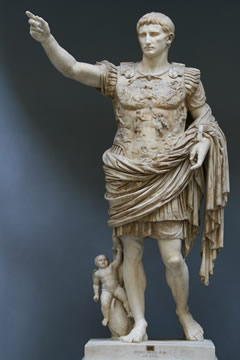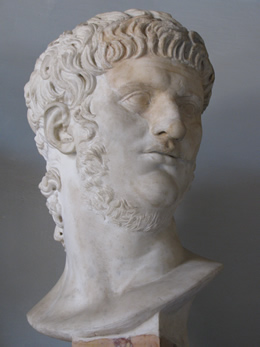Give Your Money to Caesar, Give Your Self to God
For Sunday October 16, 2011
Lectionary Readings (Revised Common Lectionary, Year A)
Exodus 33:12–23 or Isaiah 45:1–7
Psalm 99 or Psalm 96:1–13
1 Thessalonians 1:1–10
Matthew 22:15–22
Last month I sold a family coin collection to a local dealer. The owner of the store specializes in coins from antiquity, especially those from the Greek and Roman periods. There in his glass cases were hundreds of coins from the Roman emperors who reigned during the days of Jesus and the early believers — Augustus (d.14 AD), Tiberius (d. 37AD), Caligula (d. 41 AD), Claudius (54 AD), and Nero (d. 68 AD). With over 4,000 coins in his inventory, I like to imagine that one or two of them circulated among Jesus and his friends.
 |
January 16, 27 BC – August 19, 14 AD. |
The different coins were similar in one respect. In a graphic display of political hubris and economic might, they all bore the image of their emperors. The coins reminded me that the stories of Jesus are not ethereal platitudes. Rather, the Jesus stories recall confrontations that were embedded in a concrete time and place. In this week's gospel Jesus tells a story about taxes and illustrates it with a coin from Tiberius. In doing so he confronts three major idolatries of both his day and ours: money, the state, and religion.
Like us today, the Jews of Jesus's day were saddled with onerous taxes. In Matthew 17:24–27 we read about a Temple tax. They also paid custom taxes and taxes on land. In the gospel of Matthew for this week a controversy arose about yet another tax, an annual tribute tax paid to Rome: "Is it right to pay taxes to Caesar or not?" (Matthew 22:17). Why should poor peasants in Israel send their hard-earned money all the way back to Rome and its emperor?
As you might expect, and also like us today, the Jews of that day disagreed about how to answer this question. Those whom we might call "realists" collaborated and cooperated with Rome and paid the tax. Maybe they did it out of conscience, or maybe as a survival strategy; who wanted undue attention from Rome? The "idealists" of a more nationalistic bent resisted, resented and protested Roman economic exploitation out of principle (think of the 17th century Quakers).
The Pharisees who despised Rome and the Herodians, as their name implies, who cooperated with Rome, were opposing sects, so it's no surprise that what they really wanted was not an honest answer to a complicated question but rather "to trap Jesus in his words." That seemed easy enough. If Jesus agreed that the Jews should pay taxes to caesar, that sounded like capitulation to the oppressive Romans and a renunciation of Jewish nationalism. He would have lost his audience.
 |
September 18, 14 AD – March 16, 37 AD. |
But to answer in the negative so as to encourage tax-dodgers was political sedition that would have jeopardized his ministry and endangered anyone who followed his advice. In an important aisde, we should remember that this was one of the charges that led to Jesus's criminal execution: "This man opposes paying taxes to caesar and claims to be Christ, a king" (Luke 23:2). It was a false charge, but one based on Jesus's many subversions of money, politics and power.
In fact, one of the principal criticisms against the early Christians was that they were "atheists" because they refused to bow down to caesar, to participate in the cult of imperial worship, that they made the subversive confession "Jesus is Lord" (= caesar is not lord), and practiced what eventually was branded an illegal (= non-state) religion. The simplest Christian confession is fraught with economic and political implications.
The trick question elicited a trick answer from Jesus. He asked them for the coin that was used to pay the state tax, then asked whose image it bore. Most likely the coin in question bore the image of the emperor Tiberius who ruled Rome during those years (AD 14–37). One side of the coin would have deified Tiberius as a "son of the divine Augustus." The other side would have honored him as the "Pontifex Maximus" or "chief priest" of Roman polytheism — which is to say that the two sides of the coin celebrated absolute religious and civil authority for Tiberius.
 |
October 13, 54 AD – June 11, 68 AD. |
To a nationalistic Jew who confessed a radical monotheism, such a graven image was religiously offensive and politically humiliating. Certainly much of the crowd would have been repulsed at the political, religious, and economic implications of honoring a pagan "god" by paying a tax to him. What should a conscientious Jew do? How would Jesus respond to this lose-lose proposition?
When Jesus's questioners said that the coin bore the image of caesar, he replied with a cryptic and enigmatic answer: "Give to caesar what is caesar's, and to God what is God's." Rather than making an inflammatory political statement by denouncing Rome, maybe Jesus sought to evade their trap with a dismissive shrug — "If the coin belongs to caesar, let him have it. So what? It's only money." In this scenario Jesus refused to take their bait. We might even imagine Jesus taunting his questioners by pocketing the coin.
But what about the second half of his advice? What do we owe to God? Merely a temple or state tax, or everything, which is far more than money? I like the conclusion of New Testament scholar Marcus Borg:
Thus this text offers little or no guidance for tax season. It neither claims taxation is legitimate nor gives aid to anti-tax activists. It neither counsels universal acceptance of political authority nor its reverse. But it does raise the provocative and still relevant question: What belongs to God, and what belongs to Caesar? And what if Caesar is Hitler, or apartheid, or communism, or global capitalism? What is to be the attitude of Christians toward domination systems, whether ancient or modern?
At issue is not merely my economic relationship to the government, but my existential relationship with God. On that ancient coin was an image of caesar, and merely money is owed to him. On the other hand, and far more importantly, every human being bears the image of God, implying that I "render to God" wholly and without condition my entire self. So pay your taxes to caesar, and give your self to God.
Image credits: Wikipedia.org.





